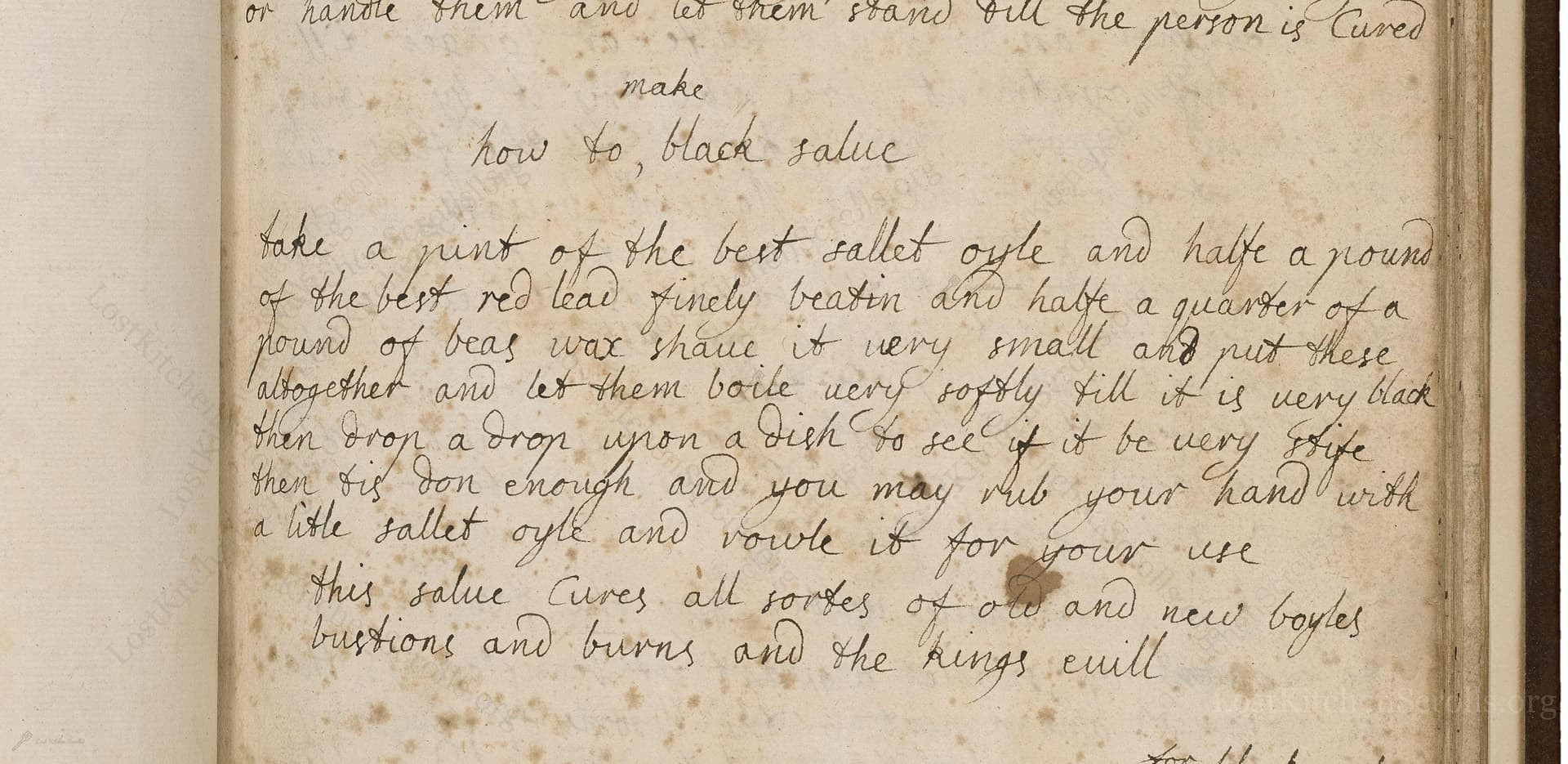How To Make Black Salve
From the treasured pages of Receipt book
Unknown Author

How To Make Black Salve
"take a pint of the best sallet oyle and halfe a pound of the best red lead finely beatin and halfe a quarter of a pound of beas wax shaue it very small and put these altogether and let them boile very softly till it is very black then drop a drop upon a dish to see if it be very stife then tis don enough and you may rub your hand with a litle sallet oyle and voule it for your use. This salve Cures all sortes of old and new boyles bustions and burns and the kings evill"
Note on the Original Text
The recipe is written in the concise, instructive style of early modern household manuals, with little distinction between culinary and medicinal preparations. Measurements such as ‘pint’ and ‘pound’ followed contemporary English standards, though ingredient clarity (such as 'sallet oyle' for salad oil) depended on local custom. Spellings reflect the phonetic and variable orthography of the period, while instructions presume a practical familiarity with kitchen tasks on the part of the reader.

Title
Receipt book (1700)
You can also click the book image above to peruse the original tome
Writer
Unknown
Era
1700
Publisher
Unknown
Background
A delightful glimpse into the kitchens of the early 18th century, this historic culinary manuscript promises a feast of recipes, remedies, and perhaps a pinch of mystery. Expect both practical fare and elegant inspiration for the curious cook.
Kindly made available by
Folger Shakespeare Library
This recipe dates to circa 1700, a time when household remedies were commonly prepared in the home and passed down through manuscripts. Black salve like this was believed to cure a range of skin ailments from boils and burns to the 'king’s evil' (scrofula, or tuberculosis of the lymph nodes). The recipe was preserved in a household collection of medical and culinary knowledge, reflecting both the resourcefulness and the limited medical understanding of the era.

Historically, this salve was made using simple but sturdy kitchen tools: a small cauldron or saucepan for gentle boiling, a wooden spoon for stirring, a knife to shave the beeswax, and a cool ceramic plate or dish to test the salve’s firmness. The shaping of the cooled salve with oiled hands gave it a practical and personal finishing touch.
Prep Time
10 mins
Cook Time
20 mins
Servings
8
We've done our best to adapt this historical recipe for modern kitchens, but some details may still need refinement. We warmly welcome feedback from fellow cooks and culinary historians — your insights support the entire community!
Ingredients
- 1 pint + 4 fl oz best quality salad (olive) oil
- 8 oz (1 cup) finely ground red ochre (substitute for original red lead, which is toxic)
- 2 oz (about 1/4 cup) finely shaved beeswax
Instructions
- To prepare a version of black salve with modern measurements, begin by combining 1 pint + 4 fluid ounces of high-quality salad oil (olive oil is traditional) with 8 ounces (1 cup) of finely powdered red lead (note: red lead is highly toxic and not used today; for demonstration, use red ochre or iron oxide as a safe substitute).
- Next, add 2 ounces (about 1/4 cup) of beeswax, grated finely.
- Place all ingredients into a heavy-bottomed saucepan and gently heat on low, stirring often, until the mixture turns very black.
- To test for readiness, drop a small amount onto a cool dish—if it stiffens quickly, the salve is done.
- Allow to cool slightly, then, with oiled hands, roll or shape the salve for use.
Estimated Calories
260 per serving
Cooking Estimates
You will need about 10 minutes to measure and prepare the ingredients, and about 20 minutes to cook and combine everything. This recipe makes about 8 portions for topical use. Each serving contains about 260 calories, mainly from the olive oil and beeswax.
As noted above, we have made our best effort to translate and adapt this historical recipe for modern kitchens, taking into account ingredients nowadays, cooking techniques, measurements, and so on. However, historical recipes often contain assumptions that require interpretation.
We'd love for anyone to help improve these adaptations. Community contributions are highly welcome. If you have suggestions, corrections, or cooking tips based on your experience with this recipe, please share them below.
Join the Discussion
Rate This Recipe

Den Bockfisch In Einer Fleisch Suppen Zu Kochen
This recipe hails from a German manuscript cookbook compiled in 1696, a time whe...

Die Grieß Nudlen Zumachen
This recipe comes from a rather mysterious manuscript cookbook, penned anonymous...

Ein Boudain
This recipe comes from an anonymous German-language manuscript cookbook from 169...

Ein Gesaltzen Citroni
This recipe, dating from 1696, comes from an extensive anonymous German cookbook...
Browse our complete collection of time-honored recipes



